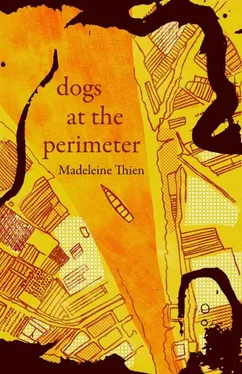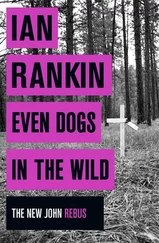“The conceptual and the abstract,” Hiroji told her, “are no longer as accessible. Your interior world has changed.”
Hiroji and I co-authored a paper on Elie’s condition. He described to me how, in Elie’s home, her paintings graced the walls. He had the sense that they pleased her because they brought the interior world into the world that we live in, the one that we hold and touch, that we see and smell. “Soon,” she had told him, tapping her fingers against her chest, “there will be no inside.”
Elie is almost completely mute now. When she telephoned Hiroji, she wouldn’t speak. She would hit the keypad two or three times, making a kind of Morse code, before hanging up again. Her disease is degenerative, a quickening loss of neurons and glia in the other parts of her brain, impeding speech, movement, and finally breathing itself. Unable to paint, she and Gregor spend long days at the riverside, where, she once told Hiroji, things move, ephemeral, and nothing stays the same.
Two years ago, delivering a lecture in Montreal, Hiroji spoke briefly about consciousness. He said that he imagined the brain as a hundred billion pinballs, where the ringing of sound, in all its amplitude and velocity, contained every thought and impulse, all our desires spoken and unspoken, self-serving, survivalist, and contradictory. The number of possible brain states exceeds the number of elementary particles in the universe. Maybe what exists beneath (tissue and bone and cells) and what exists above (ourselves, memory, love) can be reconciled and understood as one thing, maybe it is all the same, the mind is the brain, the mind is the soul, the soul is the brain, etc. But it’s like watching a hand cut open another hand, remove the skin, and examine the tissue and bone. All it wants is to understand itself. The hand might become self-aware, but won’t it be limited still?
A few days after the lecture, Hiroji received a letter from a man recently diagnosed with Alzheimer’s. I have been wondering, the man wrote, how to measure what I will lose. How much circuitry, how many cells have to become damaged before I, before the person my children know, is gone? Is there a self buried in the amygdala or the hippocampus? Is there one burst of electricity that stays constant all my life? I would like to know which part of the mind remains untouched, barricaded, if there is any part of me that lasts, that is incorruptible, the absolute centre of who I am.
[end]
Before, on my sleepless nights, I used to tiptoe down the hallway and stand in Kiri’s open doorway. My son, collector and purveyor of small blankets, is a light snorer. The sound of his breaths calmed me. Daring to enter, I would listen to his sleep, to the funny, stuttering exhalations that seemed altogether unearthly. Kiri, you are a godsend, I’d think. A mystery.
Taka the Old appears at the ledge of the window. Hiroji’s cat watches me nervously, twitchily. Hours ago, I must have forgotten to remove my coat so I unbutton it now, shake it off, and fold it neatly over the back of a chair. The cat sidles nearer. We are two nocturnal creatures, lost in thought, except that she is sober. She rubs her face against the coat’s empty arms, she purrs into its dangling hood.
I open the curtains. Nearly four in the morning and the view outside is fairy-tale white, a sharpened landscape that seems to rebuke the darkness, Go back, go back, return from whence you came! Snowdrifts and frozen eaves merge into cars, outlined in inches of snow. On the frosted windowpanes, I trace Khmer letters, Khmer words, but mine is a child’s uncertain calligraphy, too wide, too clumsy. I was eleven years old when I left Cambodia, and I have never gone back. Years ago, on the way to Malaysia with my husband, I glimpsed it from the air. Its beauty, unchanged, unremitting, opened a wound in me. I was seated at the window and the small plane was flying low. It was the rainy season and Cambodia was submerged, a drowned place, the flooded land a plateau of light. From above, there were no cars or scooters that I could see, just boats plying the waterways, pursued by the ribbon of their slipstream.
Silence eats into every corner of the room, creeping over the furniture, over the cat. She paces the room like a zoo lion. At the desk, I sharpen pencils ferociously, lining them up in a row.
On the floor is the file I keep returning to. When Hiroji disappeared, I had found it sitting on his kitchen table and had taken it away, never mentioning it to anyone, not the police, not even Navin. I had kept it in an old suitcase, as if it were a memento, a relic that Hiroji asked me to safeguard. The file contains the same documents and maps, the same letters from James, that Hiroji asked me to examine last year. I remember him unfolding the map, putting his finger against Phnom Penh, here , where the ink is smudged, the city at the confluence of the rivers. Back then, the map had seemed too flimsy to me, too abstract, a drawing of a country that had little relation to the country I had left behind. I couldn’t see what he was seeing.
James Matsui had vanished in 1975. Four years earlier, having finished his residency at St. Paul’s Hospital in Vancouver, he had signed up with the International Red Cross. Soon after, he had left Canada and landed in Saigon, into the mayhem of the Vietnam War. That same year, Nixon’s bombs were falling on Cambodia, spies were breaking into the Watergate building, scientists had found a way to splice dna, but I was young and didn’t know those stories. I was eight years old, a child in Phnom Penh, and the fighting, at that time, raged in the borderlands. I remember staring up at the sky, transfixed by the airplanes. They were everywhere above us — commercial planes, fighter planes, transport planes, helicopters — a swarm that never ceased. My father told me about a woman named Vesna Vulovic. The plane she was travelling in had exploded over Czechoslovakia and she had fallen thirty-three thousand feet to the ground. She had survived. I named all of my dolls — I had three — Vesna. To me, she was like a drop of rain or a very tiny bird, someone whom the gods had overlooked.
From the file, I remove James’s letters to Hiroji. Born Junichiro Matsui, nicknamed Ichiro when he was a boy, he chose the name James when he was a teenager. His letters home are brief, scattered with ellipses, and yet I keep returning to them, convinced that I have missed some crucial detail. In 1972, the Red Cross sent him up the Mekong River, away from Vietnam and into the refugee camps of Phnom Penh. Cambodia was in the last stages of a civil war, a brutal war of attrition.
“Undying,” my father told us once, in admiration of the resistance, the Khmer Rouge.
“The undying,” my mother answered, “are always the most wretched.”
In January 1975, James’s letters stopped. Three months later, the Khmer Rouge won the war and the borders closed around my country.
Turn my head, go back, and I’m hiding with my brother in the hall closet, crouched on top of my mother’s shoes. “You’ll see,” my father is saying. We can hear his voice, tipsy and melodious, through the wooden door. “The Khmer Rouge will turn out to be heroes after all.”
My uncles, great-uncles, and distant uncles shout to be heard. “Lon Nol,” I hear. “Traitor!” “Crawling into bed!” “Contemptible!” “Chinese rockets!” My father’s parties are always boisterous, more and more as the war goes badly. The North Vietnamese Army against the American military, the Khmer Rouge versus the Khmer Republic, Communism against Imperialism, everyone takes a side, and some take every side. My father says that this war is about the future, about a free Cambodia, that we have to liberate the country from our own worst selves. He says our leaders have lost their moral centre, they are obsessed with cognac and soda, and villagers’ mumbo jumbo. The uncles cackle, and someone scratches at the door. I think it must be my cousin, Happy Nimol, who clings to us like wet grass.
Читать дальше












